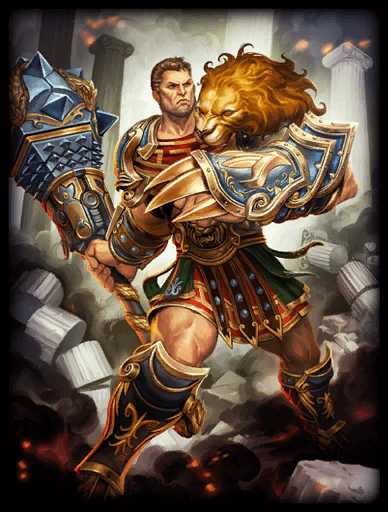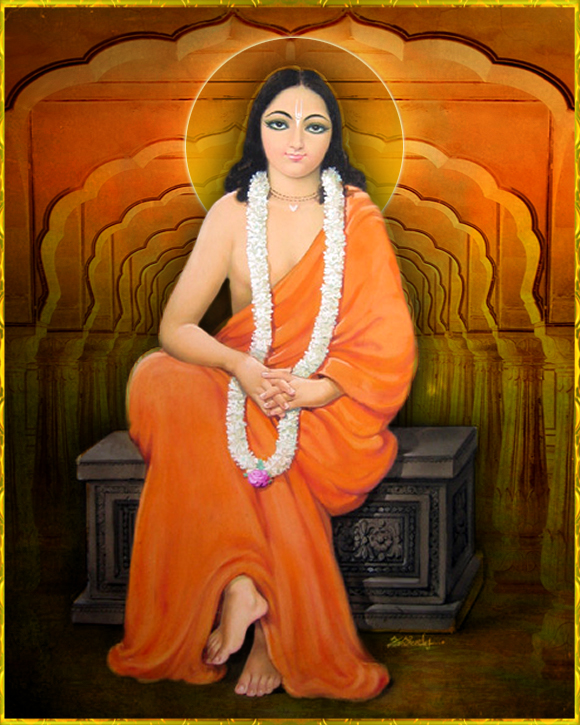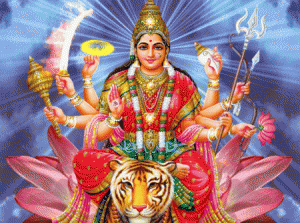Perhaps one of the most demeaning words, offensively carrying the heavy abrahamic bias, is the term DEMIGOD, that stabs directly at the core of the Divinity concept in Hinduism, creating a sense of inferiority and incompleteness in the Vedic vision as compared to the perceived greatness and supremacy of the “monotheistic” God.
 We would better understand this problem if we examine the basic abrahamic ideology, in which “the gods” (with the small “g”) are nothing more or less than different manifestations of Satan himself, the Great Enemy that man must oppose and destroy in all possible ways because Jahweh is not capable or willing to do it himself.
We would better understand this problem if we examine the basic abrahamic ideology, in which “the gods” (with the small “g”) are nothing more or less than different manifestations of Satan himself, the Great Enemy that man must oppose and destroy in all possible ways because Jahweh is not capable or willing to do it himself.
The diminutive word DEMIGOD (literally, “half-god”, “demi” meaning “half” in French) was introduced by Christian academics to refer to those individuals who, in the ancient pre-abrahamic cultures, were said to be born from the sexual union of a god (a mythological being defined with a small “g”) with a mortal human being.
Some of such demigods were for example Hercules, Achilles, Romulus/Remus the founders of Rome, and even the “giants” mentioned in the Bible as the progeny of the “sons of God” and the “daughters of men”.
According to this understanding, the “demigods” in Vedic tradition would be somebody like the Pandavas – the sons of Kunti conceived with divine personalities such as Surya, Yama, Vayu, Indra and the Asvini kumaras. However, the colonial education in India and the biased English renditions of the Vedic texts have applied the term “demigod” to the various Personality of Godhead that are worshiped in the traditional ceremonies and describes in the traditional scriptures.
 Therefore, some people have come to believe that Vishnu is God, while Shiva, Surya and Brahma are “demigods in sattva guna” and Bhairava, Chandi, Mahakali etc are “different demigods under tamas guna”. This is a dangerous mistake, due to a limited understanding and a separatist mentality.
Therefore, some people have come to believe that Vishnu is God, while Shiva, Surya and Brahma are “demigods in sattva guna” and Bhairava, Chandi, Mahakali etc are “different demigods under tamas guna”. This is a dangerous mistake, due to a limited understanding and a separatist mentality.
It’s like saying that the high court judge is nothing more than a criminal because he deals with violations of the law, or that the manager of a dairy farm is nothing but a cow because he concerns himself with the production of milk.
The fact is that all the various Devas are simply different Personalities of the same Godhead, just like the various limbs of the body are non-different from the body itself. The perspective called acintya-bheda-abheda tattva, “inconceivably different and non-different” is the best explanation of this reality.
Unfortunately, this profound perspective (taught by Krishna Chaitanya, the founder of the Sankirtana movement) has become clouded and distorted in the minds of some followers in his lineage, with the result of fostering ignorance rather than knowledge, adharma in the name of dharma, and committing offenses in the name of avoiding offenses.
 Understanding the concept of Devas is not easy, because in our ordinary experience we develop relationships with different individuals, each one of them having specific qualities and characteristics, abilities and tendencies. When we want our hair cut we go to the barber, when we want bread we go to the baker, and when we want our vehicle repaired we go to the mechanic. If you are unable to make your own iron tools you go to the blacksmith and ask what you want, pay some money and get your article.
Understanding the concept of Devas is not easy, because in our ordinary experience we develop relationships with different individuals, each one of them having specific qualities and characteristics, abilities and tendencies. When we want our hair cut we go to the barber, when we want bread we go to the baker, and when we want our vehicle repaired we go to the mechanic. If you are unable to make your own iron tools you go to the blacksmith and ask what you want, pay some money and get your article.
Similarly, if you cannot grow your own vegetables or fruits, you go to those who sell vegetables and fruits, if you are unable to overcome a disease you go to the doctor, if you are illiterate and want to read a letter from a relative you go to the school teacher, if you want an electrical connection you go to the officer in charge, and so on.
These are all different persons, each endowed with the specific power that can fulfill one of your wishes, and you approach them one by one according to the circumstances. When you have obtained what you wanted, you may be somehow grateful but generally the relationship remains superficial. Materialistic people project the same scenario on the religious level.
So for a materialistically minded person there is not much difference between this ordinary experience and the Hindu tradition that says that one who wants good health should worship Surya (the Sun), one who wants to acquire knowledge should worship Sarasvati, one who wants to get wealth should worship Lakshmi, one who wants to progress without obstacles should worship Ganesha, and so on. But this is a mistaken conception.

Brihad Aranyaka Upanishad (1.4.10) states that one who worships the Devas by considering them different (from the Supreme, or from each other, or from Reality at large), does not have the (proper) knowledge and is like an animal (pasu) to the Devas.
So what does “different” mean? There are two levels of meaning here; one applies to the non-difference between Devas, and between the Devas and the Supreme Personality of Godhead, and the other applies to the non-difference between the Devas and the worshiper.
In Bhagavad gita (7.20) Krishna clearly warns that we should not make the mistake of considering the Devas as anya, “other” or “different” from Krishna, from the Unified Transcendental Reality. This vision is confirmed by all the traditional scriptures and the great acharyas of all lineages.
The Gautamiya tantra (one of the most important texts for vaishnavas) says:
gopalam pujayed yas tu nindayed anya devatam astu tavam paro dharmah purva-dharmo ‘pi nasyati, “If one worships Gopala but disrespects other devas/ devis, his bhakti will be lost. Not only he will not be able to get bhakti, but even whatever dharma he had acquired previously will be lost.”
Bhagavata Purana clearly describes the Devas as “limbs” or “arms” of God: bahavo loka-palanam (1.11.26), indrayo bahava ahur usrah (2.1.29). Again, Bhagavata Purana (10.40.9-10) states,
sarva eva yajanti tvam sarva devamayesvaram, ye ‘py anya-devata bhakta yady apy anya-dhiyah prabho, yathadri prabhava nadyah parjanyapuritah prabho visanti sarvatah sindhum tadvat tvam gatayo ‘ntatah,
“Everyone actually worships you, Lord, because you are the sum total of all devas, even if devotees meditate on the other forms separately from you. Just like the rivers are born from the mountains where the rainwater is collected, and then end up into the ocean, all paths ultimately attain you.”

The variety of forms in which people worship God is not a bad thing at all: in fact God has unlimited forms, unlimited names, unlimited qualities, activities, and variety of approaches – to attract the minds of so many different people. The concept of the “preferred form of God” that one likes to meditate on and worship is called ista devata (one’s “desired form of God”). One can choose the ista devata s/he prefers, and even change his/ her choice in the course of time, when the progress in devotional service or a change of circumstances inspire him/ her to focus in a different aspect of Godhead.
Some people choose their ista devata according to the suggestions of astrologers, or to please their parents and family, or to gain acceptance into a community; however, the best reason is because of the development of his/ her own personal devotional sentiments.
The important thing is that we always remember that God is one, and that by worshiping or meditating on one form of God rather than another, we are not offending or betraying the other forms of God. All the forms of the Mother Goddess are aspects of the same Shakti, and similarly all the forms of the Lord are expansions and emanations of expansions of Isvara: we should not make the mistake of applying material limitations to the Godhead. All the various forms of the Godhead are limbs of his/ her transcendental body, and there is no real difference among them.

In the Vedic system, the genuine scriptures present a variety of Personalities of Godhead, sometimes focusing on one, sometimes on more, and even each Personality is shown in different avataras or forms in which s/he descends into this world for a divine mission. Especially in Orissa but also in many other regions (especially in ancient holy places) we find the worship of Hari-Hara (the composite form of Hari and Hara – Vishnu and Shiva as one person) and Madhava (“the husband of the Mother
Goddess”).

Some extremist vaishnavas, who have not realized the meaning of the tattva (especially its darshana called acintya bhedabheda), claim that worshiping Shiva or chanting his name constitutes an offense against Vishnu, and they quote the list of 10 offenses to be avoided in the chanting of the holy Names.
 The original text of Padma Purana (Brahma Kanda, 25.15-18) says: sivasya sri-visnor ya iha guna-namadi-sakalam, dhiya bhinnam pasyet na khalu hari-namahita-karah.
The original text of Padma Purana (Brahma Kanda, 25.15-18) says: sivasya sri-visnor ya iha guna-namadi-sakalam, dhiya bhinnam pasyet na khalu hari-namahita-karah.
Here is the dictionary meaning of the words: sivasya: of Shiva; sri visnor: of Sri Vishnu; yah: s/he; iha: here/ certainly; guna-namadi: the qualities, names etc; sakalam: everything; dhiya: in meditation; bhinnam: separated; pasyet: sees/ considers; na khalu: most certainly not; hari-nama: the name of Hari; hita: benefit; karah: that does.
The translation offered by the vaishnava extremists is as follows: “The holy Name of Krishna is source of all auspiciousness. The name, form, qualities of Vishnu are all transcendental. Therefore it is offensive to separate God, the Supreme Person (Vishnu) from his holy name, form, or transcendental qualities and pastimes, considering them material.”
Although this is one of the valid translations of the verse, it becomes ambiguous with the addition that is sometimes presented as the second part of the translation: “Similarly, it is blasphemous to think that the names of the demigods such as Shiva, Brahma etc are on the same level of the name of Vishnu, or that the demigods are equal to Vishnu.”
This invented meaning (in which bhinna, “separate” or “different” is taken to mean its exact opposite, i.e. “equal”) is compounded by the use of the improper term “demigod”,
To clarify any possible misunderstanding about that verse from Padma Purana, we therefore offer a complementary (not opposite) translation as follows: sivasya sri-visnor ya iha guna-namadi-sakalam, dhiya bhinnam pasyet na khalu hari-namahita-karah, “To contemplate, in one’s meditation, any difference/ separation between the holy names, qualities etc, of Shiva and Vishnu: this certainly destroys the benefits of chanting the name of Hari.”
Brihad Bhagavatamrita (1.2.86) very clearly confirms this meaning by stating: krsnac chivasya bhedeksa maha-dosa-kari mata, ago bhagavata svasmin ksamyate na sive krtam, “One who sees some difference between Krishna and Shiva is committing a great offense. Krishna may excuse someone who commits aparadha to his own lotus feet, but will never excuse one who commits aparadha at the lotus feet of Shiva”.
Skanda Purana teaches, “One should worship Lord Krishna, the cause of all causes, and then worship the best of the devatas, Lord Shiva. Then one should worship all the other devatas with great faith and devotion.” And again, sivasya hridayam vishnur, vishnos ca hridayam siva, “Shiva is the heart of Vishnu, and Vishnu is the heart of Shiva.”
In the Kurma purana (12.20) Vasistha (the guru of Ramachandra)answers the questions of the sons of Kartavirya Arjuna saying, “the best thing for human beings is to understand that Shiva is non-different from Visnu, therefore Shiva and Vishnu must be worshiped simultaneously”.
 Krishna himself, in the Mahabharata, presents the Siva sahasra nama stotra, to which Bhishma follows with the Vishnu sahasra nama stotra (which also contains many names such as Shiva – twice – and Sambhu, Isana, Rudra, Mahadeva and others); Krishna also instructs Arjuna to recite the hymn to Durga before the battle of Kurukshetra, following the example of Ramachandra who worshiped Durga before the battle against Ravana.
Krishna himself, in the Mahabharata, presents the Siva sahasra nama stotra, to which Bhishma follows with the Vishnu sahasra nama stotra (which also contains many names such as Shiva – twice – and Sambhu, Isana, Rudra, Mahadeva and others); Krishna also instructs Arjuna to recite the hymn to Durga before the battle of Kurukshetra, following the example of Ramachandra who worshiped Durga before the battle against Ravana.
In several scriptural texts we find direct personal disciples of Shiva who were also exalted vaishnavas – starting from Narada himself (Narada Pancharatra, ratra 1, chapters 8-9), to Garga Muni (Brahma vaivarta Purana 4.13.72), Markandeya Rishi (Bhagavata Purana, canto 12, chapter 10) and the Pracetas (Bhagavata Purana, canto 4, chapter 24) who specifically became able to approach Vishnu only after being tutored by Shiva.
The Narada Pancharatra also states: sivo harir hara iha sakshat siva eva nirupitah, siva-dveshi hari-drohi vishnum nityam bhajan api, “Shiva is Hari and Hari is none other than Shiva. One who is hostile to Shiva is hostile to Vishnu, even though he may daily worship Vishnu.”
Again, in Bhagavata Purana (10.88.38-39) Krishna addresses Shiva as visva-isa (Lord of the Universe) and jagat guru (the guru of all), and says, “If someone commits offenses against you, s/he will never get any good fortune”.
Again Srimad Bhagavatam (4.4.14) says, yad dvy-aksharam nama gireritam nrinam sakrit prasangad agham asu hanti tat, pavitra-kirtim tam alanghya-sasanam, “If someone pronounces the name of Shiva, composed by two syllables, all impurities and faults will disappear from his heart immediately. Shiva’s fame is spotless, and nobody should dare to disobey him.”
The Narada Purana (63.121, 65.58) says: diksaya guru-murti-sthah sarvanugrahah sivah, “In the process of diksha, Shiva, the universal guru, manifests in the form of the diksha guru to bless the disciple” and om namas te natha bhagavan sivaya guru-rupine, “I offer my homage to Bhagavan Shiva, who manifests in the form of the guru”. On a side note, this would explain why some so-called devotees who enjoy offending “the demigod Shiva” have so much troubles with finding a genuine guru.
Also, we can refer to the Shivastakam prayers (text 7), quoted by Murari Gupta in his Chaitanya Charita Mahakavya, where Chaitanya says: sivaya sarva-gurave namo namah; “I repeatedly offer my obeisances to Shiva, who is the guru of everyone.”
Chaitanya also demonstrated these ideas in practice through his personal example. After bathing in the Bindu Sarovara, Chaitanya eagerly went to take darshana of Tribhuvanesvara svayambhu lingam, and by seeing that it was beautifully surrounded by innumerable ghi lamps offered by the devotees, Chaitanya felt very pleased and started to dance ecstatically, singing the Names “Shiva, Rama, Govinda”.
Then he instructed his followers by quoting Krishna’s words: “One who claims to be my devotee but disregards Shiva is only trying to pretend devotion to me” and he offered worship to Shiva with all the devotees. Vrindavana Das comments: “The Supreme Lord is the supreme Guru, one who does not follow his instructions suffers because of such grievous mistake.”
 Chaitanya also visited many other Shiva temples in Bhubaneswar before resuming his journey to Puri. He resided in the house of a local devotee of Shiva, where he took his meal. In this regard, Lochana Dasa in Chaitanya mangala elaborates on the fact that Chaitanya accepted the prasada of Shiva given by this devotee. In those times there was a rumor (laukika sraddha) among caste vaishnavas according to which the prasada of Shiva cannot be consumed because of a curse by Bhrigu Muni.
Chaitanya also visited many other Shiva temples in Bhubaneswar before resuming his journey to Puri. He resided in the house of a local devotee of Shiva, where he took his meal. In this regard, Lochana Dasa in Chaitanya mangala elaborates on the fact that Chaitanya accepted the prasada of Shiva given by this devotee. In those times there was a rumor (laukika sraddha) among caste vaishnavas according to which the prasada of Shiva cannot be consumed because of a curse by Bhrigu Muni.
In the discussion reported by Lochana Dasa, Murari Gupta explains to Damodara Pandita that the effects of Bhrigu Muni curse actually strike those persons who have a contaminated consciousness and commit the offense of differentiating between Hari and Hara.
The fact is, those who accept the food offered to Shiva without committing offenses to Hari become free from material conditionings and obtain love for Krishna. This is the reason why Chaitanya gave us the example of accepting the food offered to Shiva.
Those who consider themselves as followers of Krishna Chaitanya should do well to make an extra effort to better understand Shiva’s actual position in early Gaudiya vaishnavism, especially in regard to the process of initiation and to the relationship between guru and disciple.
Krishnadasa Kaviraja, in his Sri Vraja dhama mahimamrita, glorifies Shiva as Gopisvara – still today, genuine pilgrims humbly offer their obeisances to Gopisvara Mahadeva in his temple before starting their Vrindavana parikrama. It would also be wise, for the prakrita sahajya fans of Vrindavana Krishna, to remember that Shiva is the kshetrapala (guardian) in Vrindavana (as in all the other holy places) and specifically watches the rasa mandala area, so that unqualified people will not be able to enter it.
The same applies to the Mother Goddess.
 Rupa Gosvami worshiped a Deity of Durga, and Jiva Gosvami in his commentary to the Brahma samhita states that the form and mantra of Krishna is protected by the presiding Deity Yogamaya Durga (which is also confirmed in Gita: yoga maya samavritah).
Rupa Gosvami worshiped a Deity of Durga, and Jiva Gosvami in his commentary to the Brahma samhita states that the form and mantra of Krishna is protected by the presiding Deity Yogamaya Durga (which is also confirmed in Gita: yoga maya samavritah).
In his Chaitanya Bhagavata, Vrindavana Dasa quotes the prayers composed by Krishna Chaitanya himself on the occasion of the festival in the house of Chandrasekhara in Mayapur:
“All glories to the universal Mother, Mahamaya Devi.
Kindly give the shelter of your lotus feet to the wretched conditioned souls who suffer in this material world. You are the controlling power of the entire material universe and you appear in every yuga to uphold the principles of religion. Even Brahma, Vishnu and Shiva are unable to fully describe your unlimited powers, what to speak of ordinary people.
You are faith, compassion, modesty, and the personification of pure devotion to Lord Vishnu, Krishna, so all branches of knowledge are your manifestations. The Vedas describe you as the original energy, and you appear to be within this material nature consisting of the three gunas but you are actually their cause, and you are always situated in a transcendental position.
You are the eternal, unchanging, supreme energy, the shelter and resting place of all living entities, the universal Mother who sustains everyone, matchless and unrivalled. You are the life sustaining water, and by remembering you one can easily cut the bonds of material illusion. You appear also as Mother Lakshmi, the eternal consort of Lord Narayana, in the homes of the dharmic people, but to the sinful offender you manifest as the all-devouring death.
You are the creator of the universe and those who ignore you, not offering you worship, are punished by the threefold miseries. To the devotees you inspire pure faith, and therefore we pray you to please give us shelter in the shade of your lotus feet. Your illusory potency keeps the entire creation enthralled, so if you do not protect me, who will? Your appearance in the material world is to deliver the conditioned souls, and by remembering you one attains all perfection. O Mother, we are all surrendered to you, kindly look upon us with benevolence, so that we may remain with a fixed mind at your lotus feet.”
Note: Interested readers can peruse the published works of mataji Parama Karuna Devi at their local Amazon supplier.


































